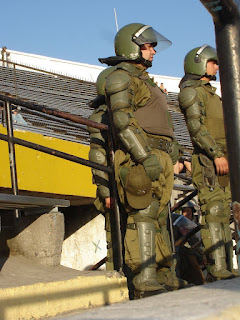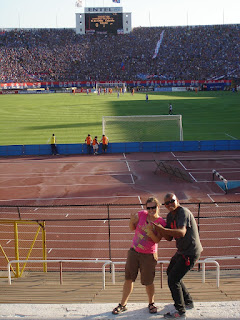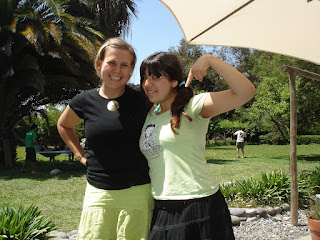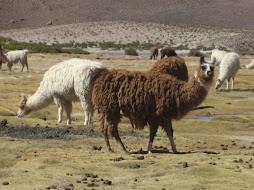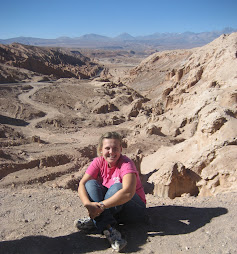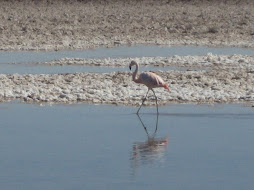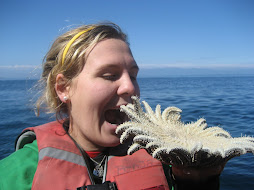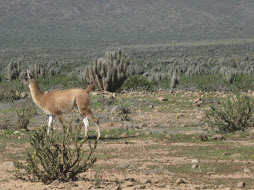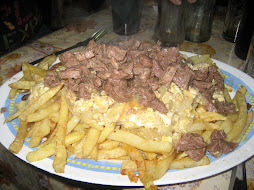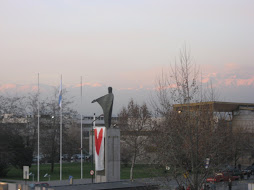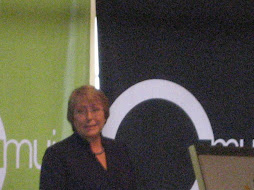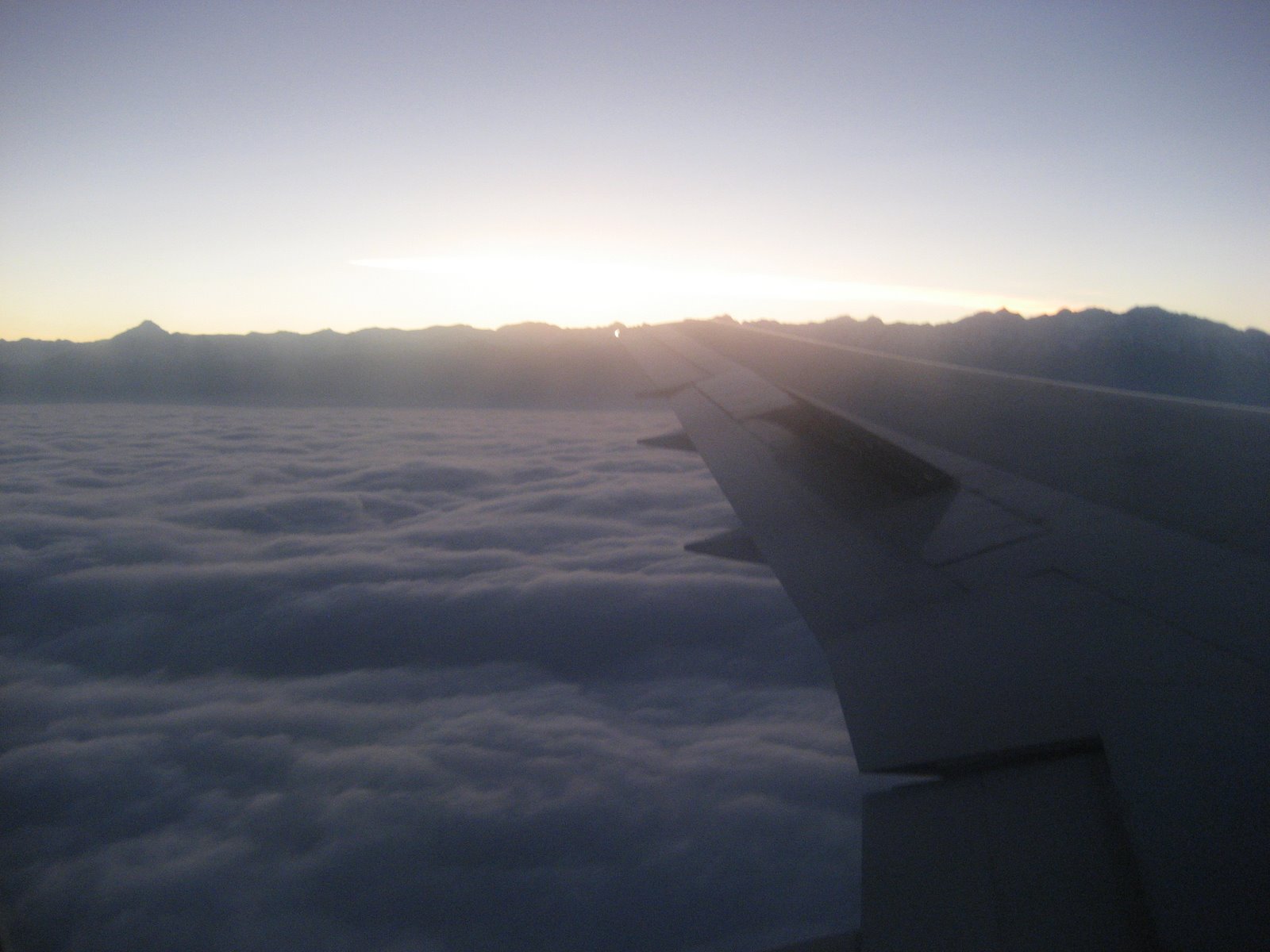It was as if a glacier national park had been plowed down in the middle of a West Texas prarie. Or the mountains of New Zealand had been dropped into the Australian outback. A lowercase landscape suddenly turned into uppercase ALPS. Some 12 million years ago, deep in the earth, a huge fist of molten magma stuck its fist upward, making peaks out of plains. And today those geological knuckles still pack a punch that can leave you almost breathless (especially if you are climbing). This towering landscape is all the more beautiful for being so unexpected in the middle of low-hilled, lumpy Patagonia.
Saturday November 29:
Flew down from Santiago to Punta Arenas with two girls from my program- Erin and Liz. Watching the flight path on the monitors during our 3.5 hour plane ride was incredible-seemed like we were almost going to Antarctica! (maybe some day I'll make it all the way down there...)
The in-flight movie was Mamma Mia. Fortunately, my friend and fellow lover of cheesy lyrics Erin was sitting right next to me, so we quietly sang along to all of ABBA's hits. Good preparation for our sing-a-longs to come during our trek.
Arrived in Punta Arenas and immediately went to get bus tickets to go to Puerto Natales, a town known as the gateway to Torres del Paine National Park. Unfortunately, after wandering around town to three different bus terminals, we discovered that the next available bus didn't leave for another 8 hours. Blah.
Ran into a nice Australian couple who were searching for bus tickets as well. They were in the middle of a 3 month whirlwind tour around South America. Amazing. I actually can't even keep track of the number of Europeans and Australians that we've met who have decided to take 3-12 month off to do some travelling. I still don't understand how they get so much time off from work...though it appears to be much more common in places outside of the US. It's also been intersting just noticing the difference between North American vacationers and European/Australian vacationers. First of all- aside from other study abroad students, I've only run into a handful of US tourists in South America. Perhaps that's partly due to my choice of accomodation when travelling (hostels); however, I think I can safely say that South America is just not a popular travel spot for North Americans. On the other hand, this place is chock full of Australians, Germans and Brits.
More general observations - it seems that while most Americans wait until they're retired to go on long-term vacations, most European/Australians go when they're young (late 20s, early 30s). Perhaps because of this age difference, it seems like more European/Australians go on adventure vacations while Americans prefer relaxation/luxury vacations. (or maybe Americans are just more stressed out from work and hence crave more relaxation time?)
Sorry for the tangent...okay back to the trip:
Okay so waited for the bus by just wandering aroud Punta Arenas. Tiny little tourist town with funky trees.
Don't these trees belong in a Nintendo game?
Punta Arenas is also a departure point for Isla de Magdalenas - a penguin colony with like 5,000 of those little critters who swim all the way from South Africa! Talk about stamina. Unfortunately, we didn't make it out there. But we saw the island in the distance!
Lala eventually caught the bus and took a 2.5 hour ride north to Puerto Natales - the entry town into Torres del Paine National Park. There, we met up with Millie, Kristen and Emily - the second half of Team Patagonia - our hardcore 6-girl hiking crew. The three of them arrived the day before and went shopping in Natales for all of our food and other random supplies. They also got some great advice from our hostel -
erratic rock - (highly recommended) about how to get the most our of our time in Torres del Paine. Then that night we finalized our plans, stuffed our packs (wrapping EVERYING in layers of plastic bags in case of rain) and enjoyed one last night in the comfort of a mattress.

Millie (right) our fearless leader explaining our trekking route and Kristen (left) showing off her incredible 6 foot 2ness
General info about the park:
Torres del Paine = Blue towers. (Paine = blue in native indigenous language). Named after three granite towers that rose up about 12 million years ago and are the main attraction of the park. Kind of a misnomer because the towers are more grey than blue...but oh well.
Other attractions of the park include glaciers of the Southern Patagonia Ice Fields, brilliantly blue lakes formed by glacial runoff, and beautiful flora. The park is also unique because you can trek through it without having to spend a single night outdoors and without having to cook for yourself -- there are numerous refugios that offer bunk-bed accomodations and hot meals. However, refugio-hopping comes with a high price - about $35 a night per person for a bed + about $16 for dinner. We opted out of the refugios and instead made due with our tents and camp stoves.
So there are basically two main treks that people travel on when they go to Torres del Paine. One is called the circuit and is a big circle that goes all around the park and takes at least 7 days. The other is called the W (due to the shape of the route) and takes you through the highlights of the park in 4-5 days. You can also choose to do the W trek clockwise or counterclockwise - either starting with the Torres or ending with the Torres. Due to our time restrictions and recommendations of friends, we decided to do an expanded version of the W trek, going in the counterclockwise direction to save the Torres for last. Along with the normal route, we added on an extra day to hike on Glacier Grey (best decision of the trip) and we also added an extra half-day so that we could see the Torres at sunrise.
The W (shown in black)
Day 1:
Woke up at 6AM to freshly baked bread waiting for us in the hostel kitchen. Deeelish. Caught an 8am bus from Puerto Natales heading into the park. Got off the bus at the last stop - the furthest south we could get. Registered with CONAF - the national park service - and paid our 4,000 peso (~$6USD) chilean resident entry fee while the rest of the tourists paid 15,000 pesos (~$23 USD). Thank you student visa!
Then began a leisurely stroll into the park. Ran into a nice mountain man ending his trek who gave us an extra half a can of gas for our stove. Very generous.
Only hiked about 2 hours the first day because our first campsite (Las Carretas) was really close. You're only allowed to camp in designated areas within the park, which is kind of annoying but helps preserve the park I suppose. Also, every campsite was equipped with a flushing outhouse, which meant we saved a lot of time by not having to dig holes...
Once we got to camp we chilled by the water, sunbathed and cooked dinner. Also enjoyed our first chance to drink water straight from a stream! (We learned at the hostel that all moving water in the park is safe to drink...so unfortunately I didn't get to put Danny's water filter to use)
Erin and I had a lovely reflective talk by the water

Team Patagonia!
Emily (Syracuse), Erin (Pacific Lutheran U), Kristen (Syracuse), Liz (Indiana), Millie (Wash U)
Day 2:
Woke up bright and early and went on our merry way. Hiked through a wide open field for awhile, ran into a herd of horses. Marveled at wild orchids and the most incredible blue skies and lakes I have ever seen.
Gotta love the hiking boots and shorts style. It's all the rage.
Hiked about 3 hours to Refugio Pehoe, ate lunch, then continued on about 4 hours to Campamiento Grey. Hiked along some cliffs, battled against the trecherously strong winds and enjoyed the fabulous company of my friends. When we got close to Camp, we saw Glacier Grey in the distance - which gave us a great morale boost to keep up our energy knowing that the next day we'd be hiking ON that glacier!
Camp Grey was way more popular than Las Carretas - had about 20 tents of people while Las Carretas had only 4. Camp Grey was also right next door to Refugio Grey, which meant that we had shower access, so a few of us jumped at the opportunity to was off some of the funk that we'd already aquired. Then some of us did "laundry" by soaking off our clothes in the FREEZING glacial-melt lake in front of our camp. Had some reflection time while watching little icebergs melt away throughout the afternoon.
Day 3:
Stayed at Camp Grey and had an easy morning just hanging out and talking with people. Then in the afternoon, we went on a guided glacier trek of Glacier Grey!
Took a boat over to the glacier, strapped on our crampons, picked up our piolets (YES!) and then followed our guide all around the glacier. Watched bubbles of air pop in the water, releasing air pockets trapped underground from thousands and thousands of years ago and drank the most utterly delicious water I've ever tasted. (I've already got the patent on glacier water-- don't try to steal it).

Liz examining her cramposn (with piolet in the background)

Later I just laid on the ground and slurped up the water like a dog. I think I lost all shame in Chile.

Ern and some beautiful blues!
Oh yeah! We also made some nice friends on our glacier tour, all three of whom we ended up seeing every day on the trail and even back in town after we finished the trek! First was a lesbian German couple who had been travelling around South America for a few months. They were nice but didn't speak much English or Spanish. Then there was Stefan, a Swiss photographer aspiring to get his pictures in National Geographic! Stefan was really adorable with his broken English and seemed kinda lonely (after travelling 6 months all throughout the US and New Zealand). He was really weighed down with all of his heavy camera equipment, so we tried to help him out by sharing food with him and just making light conversation whenever we saw him (and we pretty much passed by each other every 3 hours or so). Stefan's photo gallery captures Torres del Paine way better than my pictures can-- check out some of his pictures
here.
We found Stefan on the streets of Puerto Natales after our trek!
Day 4:
Had to backtrack back down to Refugio Pehoe, where we lunched again. Then continued on over the mountain and through the woods until we got to a raging river and camp Italiano. There we ran into another group of gringa girls who were studying abroad in Santiago, one of whom I'd met before.
Italiano was really noisy - it was right next to a big whitewater river + we kept hearing what we thought was thunder. We did our little rain dances which we thought prevented the storms from coming. But then we realized that the "thunder" was actually just the rumbling of snow melting off the cliffs (see the waterfall-looking mini-avalanche below).
BLISTERS
So by Day 4 (if not before) our feet were pretty torn up and worn out. Luckily my feet just got small blisters that quickly calloused up. Unfortunately, Kristen and Liz suffered from far worse injuried. Kristen basically had a series of blisters that extended the entire length of her heel and Liz had a blister shaped like South America (truly amazing - see below). We had been using duct tape to cover up our blister spots for most of the trip, but then our wonderful German friends shared some of their magical blister bandaids (also shown in picture below) that helped the wounds heal up. Learned that "all Germans carry these things"...sofrom then on we were extra nice to any potential Germans who crossed our path.
Day 5:
Went for a morning day hike up Valle Frances. From the very end of this valley, you're supposed to be able to see the best view of the Torres (apparently a cooler view than being right up in front of them). Unfortunately, we didn't make it to the end of the valley due to blister injuries and time restrictions.
Went back to camp, then continued on our merry way to get to Camp Los Cuernos. Sang Christmas songs and dreamed about American food awaiting us. Hiked along a gorgeous blue lake and once again fought some monsoon-force winds. The worst part about the winds was that our tall backpacks practically acted like sails that would catch the wind and pull us down with them! Also had to ford a few intense rivers...no fun getting wet feet when the blisters are already a problem. But alas, our hard work paid off-- when we arrived at camp we were greeted with a lovely surprise:
Day 6:
We had been warned beforehand that this would be our hardest day of the hike...so all week we were anxious about the terrain that we'd encounter. Fortunately, we began the hike in good spirits with loud singing and endless movie and celebrity-naming games to keep our minds so occupied that we barely noticed the hills we were climbing until we descended them the following day!
Stopped at Camp Chileno to try to buy food for dinner b/c we had only packed 5 nights worth of dinners, assuming that we'd be able to pick one up along the way. Unfortunately, Chileno had no dinner goods for sale in their minimarket..so we had to go into the kitchen and beg a woman to sell us anything she had. Walked away with a dry packet to make corn soup, a bag of ramen and a mac cheese mix all for about $3USD. Ended up being our most tasty night of dinner!
Restocked, we continued on and along the way I ran into my friends Paula and Petey -- who were doing the trek in the opposite direction! Then later in the day we ran into a group of 4 girls from our program who were staying in refugios the whole time.
Petey, Paula and me
The sign said "1 minute to camp las torres" - our last campsite! This is our victory dance for making it through our long day!
W0ke up at 3:30 AM so that we could watch the sunrise as it shined over the Torres. A little scary climbing across boulders in the dark, but fortunately there was sufficient light to see at least a few feet ahead. However, at the foot of the hill we were supposed to descend, we saw an old trail marker and somehow veered off onto the wrong path, which led us up a steep, loose-gravel ridden ascent. After 15 minutes of slipping and sliding, we realized that we were definitely going the wrong way (despite the prevalant boot prints indicating that other people had taken the same path before). We were kind of up a creek without a paddle though-- we either had to horizontally get across the gravel slip and slide or slide down the gravel slip and slide and then reascend the next incline over. Decided to go with option number one...and though it was scary, we all took our time and made it safe and sound...and even in time for sunrise:

Liz reenacting our ascent (this time in daylight)
After enjoying the torres, we headed back to camp, packed up and made the descent down down down. Sped down the hills like pros, whizzing by all the day hikers climbing up in the opposite direction. One lady, sighing as we passed by, commented "oh to be under 25 again" as she watched us speed along. This comment kind of freaked me out, as I realized that I only have 4 years and one month until I am 25....so does that mean that I'm going to start slowing down then?? I started making a mental list of things that I want to do before I'm 25, but then I looked up and realized that I was freaking out over nothing -- this park was chock-full of50-70 year olds trekking along! Some of them were buff and tough backpackers (see below), while others just took the boat ride into the park and lived the refugio life. Nonetheless, they were all still active and they all inspired me to be a trekking grandma some day.
2 hours later we were done with the W :(
Crashed outside Hosteria Las Torres to wait for our bus, on which Liz and I were seated in front of two mid twenty year old boys comparing the physical attributes of female celebrities for 2.5 hours (gag). Went back to erratic rock hostel and made delicious veggie stir fry then raided the hostel's movie collection and vegged out for a good 24 hours. Also discovered an amazing vegetarian restaurant in town and scouted out the incredibly overpriced souveneirs.
Overall- a challenging, breathtaking, inspiring trip. Definitely saw the hands of God in the pristine setting. The pictures don't even come close to doing it justice...this is a trip of a lifetime - highly recommended for any outdoor enthusiast.

























